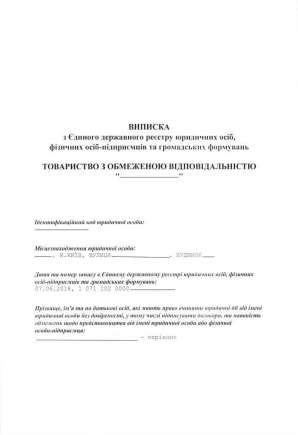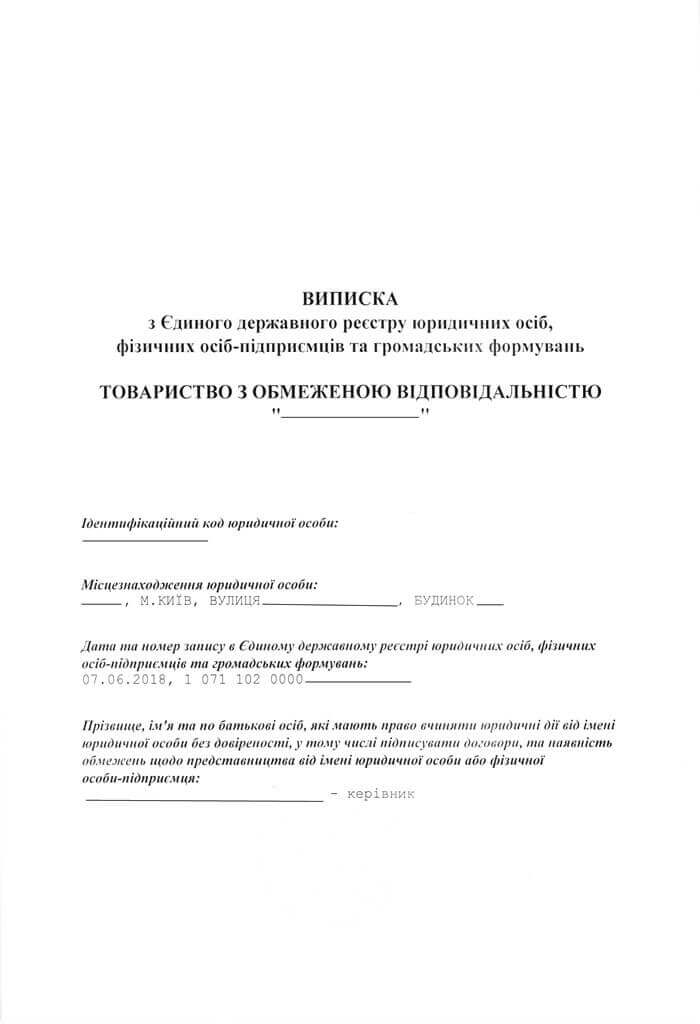Corporate relations between LLC participants in Ukraine: how to open a business if there are several founders?
Cost of services:
Reviews of our Clients
... our work on joint projects assured us of your high level of professionalism
The Limited Liability Company (LLC) is the go-to legal structure for doing business in Ukraine.
It's highly popular because it's relatively easy to create, operate, and dissolve. Moreover, LLC members are only liable for the amount they've invested, which isn't limited by law.
LLCs can also opt for a single tax, obtain various licenses for their business, and import or export goods and services. According to the State Statistics Committee, LLCs make up approximately half of all registered legal entities in Ukraine.
LLCs can be founded by one or several members, but disputes between them can arise from time to time, and they need to be resolved.
That said, LLCs remain the top choice for foreign investors looking to establish a business in Ukraine and Ukrainian entrepreneurs starting joint ventures. In this context, we'll discuss the legislative regulations of corporate relations between LLC members and why it's crucial to consider them before registering your business.
You may also like: Investing in Ukraine's LLCs: Risks for Foreign Entrepreneurs
Regulating and structuring corporate relationships in Ukraine
Corporate relationships refer to the connections between the participants of a business entity, which arise from their corporate rights.
The participants in corporate relationships are individuals who possess or control corporate rights.
For example, if you establish an LLC for your business, you and your partners will own corporate rights in accordance with the shares of the authorized capital contributed by each partner.
There are two types of requirements defined by special legislation: imperative and default. Imperative requirements cannot be altered. For instance, the LLC charter must contain the following information:
- the full and abbreviated name (if any) of the company;
- the governing bodies of the company and their competencies;
- procedures for decision-making;
- admission to and withdrawal from the company.
Failure to include these provisions in the charter will result in the rejection of the state registration application. The remaining provisions are optional or necessary, and they are included in the charter at the discretion of the participants.
Corporate relationships are also regulated by the charter. The charter of an LLC can provide detailed regulation of relationships between members and management bodies.
For example, the charter may provide one member of the LLC with the right to manage the company or the right to conclude a civil contract with the LLC's director.
In addition, the charter can establish the procedure for obtaining approval for significant transactions.
In our practice, we had a situation where we developed a special procedure for obtaining approval for significant transactions for a client. This procedure provided for the approval of significant transactions in certain matters (amount or type of transaction). For example, any agreement that involves the transfer or lease of the LLC's property, as well as loan agreements and loan agreements, required approval by the LLC's general meeting of members before its conclusion. As a result, the company protected itself from possible risks of concluding certain contracts by the executive body.
Another client who did not have a corresponding procedure in the charter had to identify transactions and confirm them post factum in accordance with the procedure established by law.
Corporate agreement s an arrangement between the members of an LLC to define their obligations for carrying out actions or refraining from doing so to exercise their corporate rights.
Corporate agreement is a relatively new tool in Ukraine for LLCs, but it has long existed and is used in other countries. The corporate agreement may regulate the order of voting at the general meeting, the sale-purchase of shares, or other matters that the members may settle among themselves.
In our practice, there was a situation where the members deemed it necessary to regulate the issue of voting on certain agenda items at the general meeting, but without redistributing the shares. We suggested concluding a corporate agreement and providing for the appropriate arrangements.
You may also like: Planning and Developing Your Business Model in Ukraine
Corporate conflict and its resolution in Ukraine
Corporate conflicts can arise for various reasons, from dividend distribution to different visions for business development. In any case, corporate conflicts need to be resolved, as they can threaten the business and the interests of its participants. There are several ways to resolve these conflicts in practice.
Negotiations and pre-trial settlement. This is the most appropriate and effective methods for resolving corporate conflicts. Tools such as share redistribution, corporate agreements, changes in business management or dividend procedures, or even a participant's withdrawal from the LLC, may be useful in this regard.
Regardless of the method used, all results and agreements must be documented. As lawyers, we try to resolve most conflicts at this stage, but the results can be different.
For example, we had a case where a corporate conflict arose due to the non-payment of dividends. We were able to explain to the majority owner that dividends would be paid to all LLC participants after a certain period, as provided in the relevant protocol.
In another case, a deep conflict arose between two LLC participants, and the only option was to divide the business between them. We helped legally secure this procedure.
Appealing in court. If a conflict cannot be resolved outside of court, then the only option left is to appeal in court. However, it's important to note that this process can be time-consuming and costly for the client.
Mediation. This is a relatively new approach under Ukrainian law, which involves a mediator – an independent third party – to help resolve the conflict. Mediation can be used as part of the pre-trial process or as a separate alternative method of dispute resolution.
Regardless of the approach used, there are factors that can help reduce the likelihood of conflicts and allow for the regulation of relations between participants. These include:
- Establishing clear regulations in the company's articles of association
- Agreeing on specific terms of interaction between participants through a corporate agreement
- Regulating relationships with investors, creditors, officials, or members of the company's management through appropriate contracts.
Our company's lawyers can assist your business in resolving potential or existing corporate conflicts.
Here are some tips for your business:
- Ensure that relationships between partners are agreed upon and documented in the charter, agreements, etc. In case of a conflict, you will have better opportunities to protect your own rights and interests.
- Avoid using template charters. Instead, ask our lawyers to develop a custom charter that reflect the real relationships within your company.
- Try to resolve any disputes between participants outside of court.
We have only covered some options and possibilities here. Corporate relationships, apart from conflict situations, involve many aspects that cannot be covered in a single material.
Our lawyers have extensive experience in regulating corporate relationships, from representation, structuring relationships and dividend payments, to issues related to exiting the company and resolving corporate conflicts.
We offer the following services to our clients:
- Consultation and development of the charter for companies based on the client's needs.
- Development of the structure of relationships between shareholders.
- Assistance in transferring shares in the company's authorized capital, including inheritance and donation of shares, disposition of shares, and other actions with the company.
- Division, merger, and acquisition (M&A) practices, and other actions with the company.
- Assistance in resolving corporate conflicts in pre-trial and judicial proceedings.
- Other issues that may arise among company shareholders.
Before starting a business or other activities in Ukraine, if you understand the need to regulate corporate relationships and ensure the safety of your business and capital, we offer a separate service – Planning and Developing a Business Model in the Ukrainian Market. This package includes an analysis of your business plans and goals in Ukraine and the development of a path to achieve your goal, taking into account all the nuances.
The cost of the package can be found below or by contacting our specialists.
Preparation and zoom meeting with the Client, at which the client discusses basic issues regarding conducting his business in Ukraine:
- Registration of a business or organization in Ukraine (procedure and stages, choice of organizational and legal form)
- Basic concepts about taxation in Ukraine and which system is better to choose for a specific activity, the need to establish PRO, VAT and other taxes
- Licenses and permits to be obtained for business/non-profit activities
- Consultation on conducting contractual work, work with personnel, etc
- Providing advice on working with counterparties, their verification and legal relations with them
- Basic consultations on the need for accounting, reporting, which must be submitted, the order and terms
- Opening a bank account, advice on compliance, answers to basic questions (if the client has them at the start)






